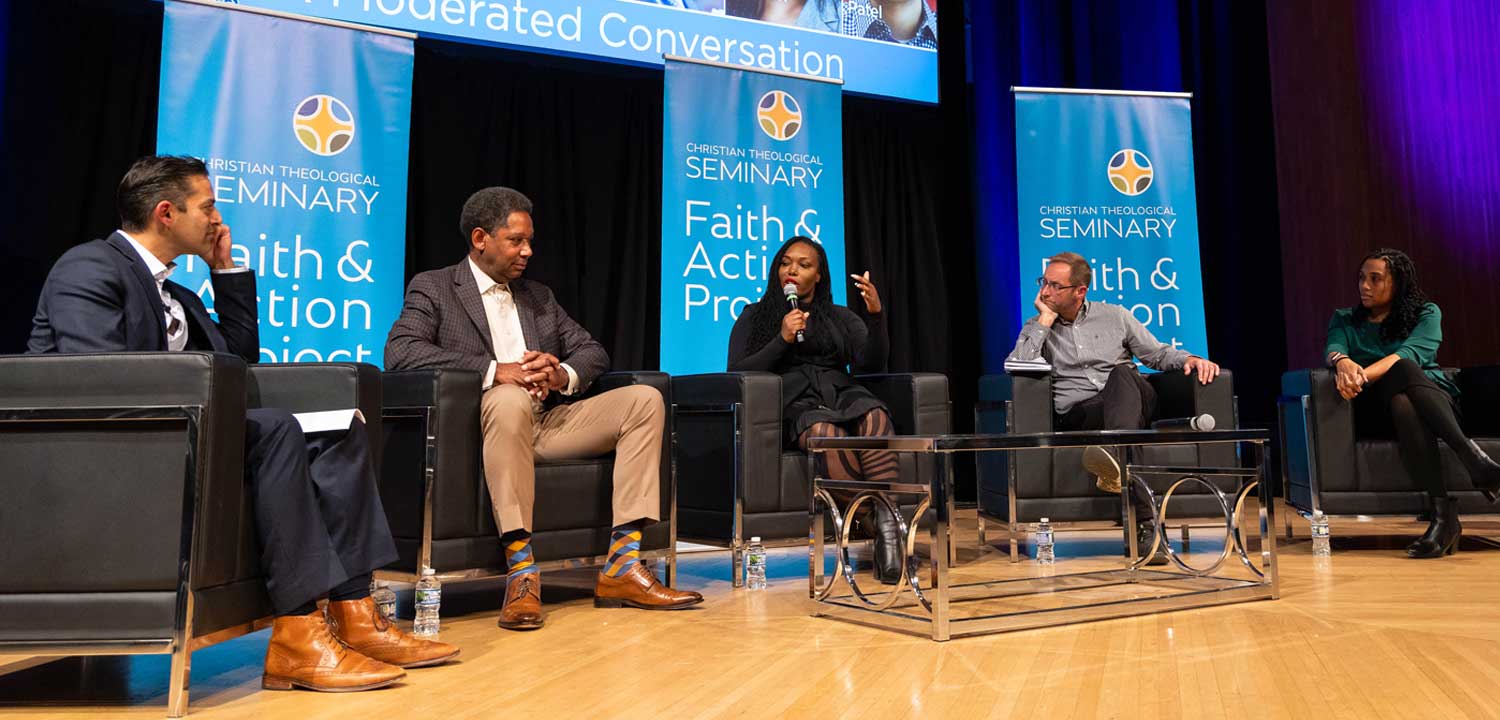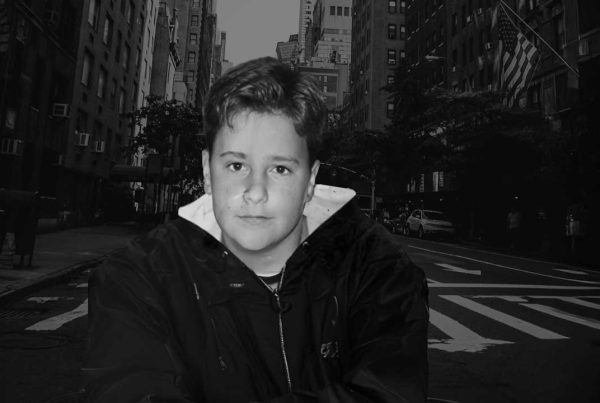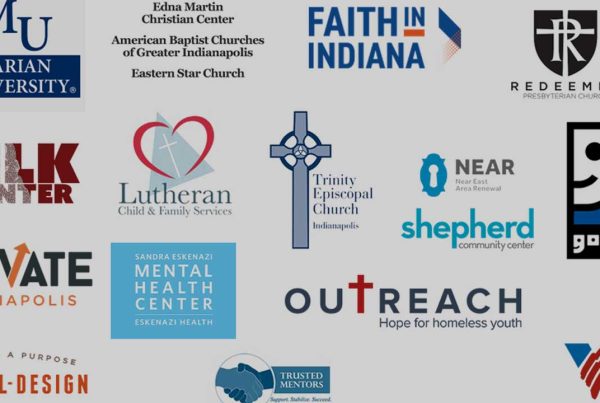Healing & Hope for our Next Generation
“Children are not born broken,” Rev. Dr. Frederick D. Haynes III told the audience at the 9th annual Faith & Action Fall Event on Nov. 12. “They are broken by the environment.” Therefore, the job of the community is not just to dress the wounds of young people but also to change the environment to give them better opportunities for success. In a panel discussion moderated by Amar Patel of Stronger Communities and featuring leaders from two Indy schools and their community partners, the audience learned how such work has been done in local neighborhoods. The evening was closed by Haynes – a social activist, member of the 2nd Cohort of CTS’ African American Preaching and Sacred Rhetoric program, and senior pastor of Friendship-West Baptist Church in Dallas, Tex. – who challenged those in attendance to embrace a “theology of justice” as a way to drive change for young people. The following are some lessons we learned from the evening’s conversation.
- Listen to the community. Too often, people, congregations, and organizations charge into neighborhoods with “answers” before they truly know what people who live there need or want. The Fall Event panelists have all demonstrated a willingness to take a leadership mindset into their communities, but they also urged the audience to listen before acting. “Engage, engage, engage,” said Joe Bowling of Englewood Community Development Corporation, stressing the importance of asking the community what young people need and hearing the answers. Then, with that information as a foundation, work with the community to address challenges. (Learn more about Englewood Community Church’s history of community engagement and recent activities by watching Mallory: 120 Years in Englewood.)
- Know the realities. Supplement this community input with data and information. Often, you’ll find stark differences from neighborhood to neighborhood or even block to block. To illustrate this point, Haynes quoted a 50 Cent lyric: “I grew up in Hell, a block away from Heaven.” In the 46218 zip code where Rooted School Indianapolis is located, for example, the average income is just $25,000, and 85% of the children at Arlington Woods Elementary School just across the street live in poverty. Compare that to the data for affluent neighborhoods just a few miles away and you’ll see the impact a short distance can have. As Rooted School Founding Leader Ma’at Lands noted, “Destiny should not be dictated by zip code.”
- Cast a clear vision. You cannot hope to make change unless you have a clear vision of impact and the ability to communicate that vision. As a mentor once told Pastor Jeffrey A. Johnson, Sr. of Eastern Star Church, whose Rock Initiative spawned Rooted School, “If you can’t write it, you can’t do it.” Once you can clearly describe your vision, share it with the community to get feedback and buy-in.
- Start with education. Good schools are the foundations of good communities, panelists said, and good schools are those that are responsive to the needs of the community and the students within it. Dr. Keeanna Warren of Purdue Polytechnic High Schools said, “We wanted to empower students to build the vision they want,” noting that students do best when they’re given “voice and a choice.” Added Lands, “Students should not have to leave their neighborhood to get a great education.”
- Embrace collaboration. No single entity can have all of the resources, talents, or opportunities required to drive real change. By collaborating with government, congregations, nonprofits, businesses, and more, you can tap into resources others already have rather than trying to create them yourself. For example, both Rooted School at Eastern Star and Purdue Polytechnic’s PPHS Schweitzer Center at Englewood found the physical space they needed by collaborating with their partners. Partnership also increases access to volunteers, expertise, knowledge, and more.
- Recognize systemic barriers … and work to overcome them. “Poverty is not a lack of resources,” Haynes said. “It is a systemic issue that destroys lives and communities.” Too often, these systems criminalize poverty and vilify the poor. Recognizing racism, othering, economic injustice, and more will make it possible to oppose them and help give youth the opportunities to break through those barriers, Bowling added.
- Engage faith communities. Faith communities have a long history of stepping up when systems keep communities from succeeding, so organizations should engage congregations in efforts to help youth overcome poverty. Haynes offered examples from the Reconstruction Era to the Civil Rights Movement and noted, “We ain’t new at this.” Pointing to Englewood Christian Church’s history, Bowling noted that a congregation seeking to make a difference must know itself – its gifts and resources, certainly, but also its limitations – in order to do the best work.
- Drive transformation, not just “treatment.” We need more than situational change and more than band-aids to make a difference. We must transform systems. For example, Warren noted that most school classrooms look the same as they did 100 years ago, and that does not serve today’s youth. Haynes illustrated the need for transformation by sharing the story of a friend with cancer. Chemotherapy was acting as a short-term fix, he said, but failed to improve her long-term prognosis. When she got a blood transfusion, however, her prospects improved dramatically. “It’s time for a transfusion” for our systems, he said.
- Be patient, and act with love. None of this will happen overnight, speakers said. So, it is important to be patient without being resigned to the status quo. Persist, Haynes urged, adding, “God shows up for the people at the back of the line.” And, finally, act with love, Haynes said, quoting Michael Eric Dyson as saying, “Justice is what love sounds like spoken in public.”
What’s next:
MEET PANELISTS & TOUR: Interested in meeting with the panelists and touring Purdue Polytechnic High Schools (PPHS) or The ROCK initiative and Rooted Schools Indy? Email Lindsey Nell Rabinowitch at lrabinowitch@cts.edu.
SHARE WHAT YOU LEARNED: If something from these lessons resonates with you, share what you learned.
WATCH THE RECORDING: A recording of the Faith & Action Fall Event.
WATCH THE PRE-EVENT WEBINAR: Check out our most recent webinar on addressing Youth Mental Health and Housing Instability with local therapists and leaders, Kelly Coker (Brightlane Learning), Joseph Myers (IYG), and Ashlyn Douthitt (Reach for Youth) by clicking here. – or check out a summary of their key insights and practical steps for staff and volunteers working with you here.
STAY ENGAGED: Stay engaged with the Faith & Action Project to learn more ways to act on behalf of children and families facing poverty.
SAVE THE DATE: Mark your calendar for the 2025 Faith & Action Spring Conference, March 11, 2025, featuring poverty and child welfare expert David Ambroz, the award-winning author of A Place Called Home. Ambroz will share his own experiences in his keynote Bridging Hope: Insights from a Journey out of Poverty and Housing Insecurity. A panel of local front-line experts will discuss compelling data and share examples of what is working that needs to be scaled up. The conference will end with key takeaways on how to help more of our neighbors attain secure housing and, as a result, a better future.





